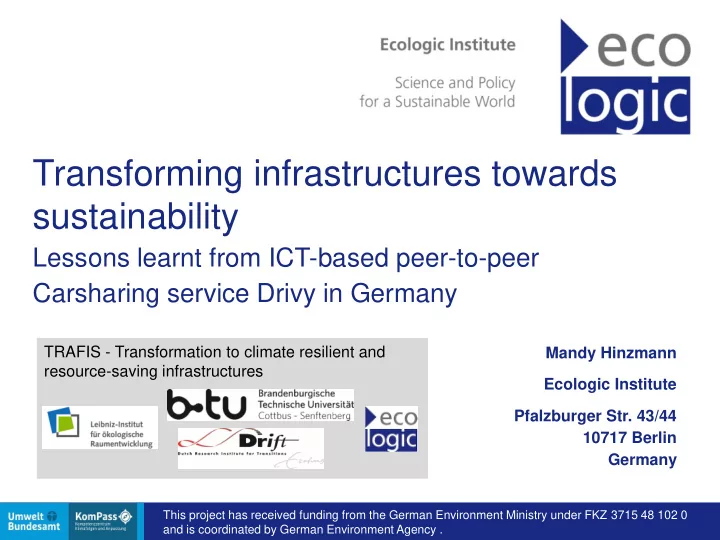

Ecologic Institute ecologic.eu Transforming infrastructures towards sustainability Lessons learnt from ICT-based peer-to-peer Carsharing service Drivy in Germany TRAFIS - Transformation to climate resilient and Mandy Hinzmann resource-saving infrastructures Ecologic Institute Pfalzburger Str. 43/44 10717 Berlin Germany This project has received funding from the German Environment Ministry under FKZ 3715 48 102 0 and is coordinated by German Environment Agency .
Ecologic Institute ecologic.eu Project context & motivation Physical infrastructures affect environmental quality & the consumption of resources: • they consume land, energy and raw materials, • they are a source of emissions. Infrastructures impact a society's understanding of how certain services are (or should be) provided & lead to collective behavioral patterns. TRAFIS explores examples of functional coupling of several infrastructures. I. Do innovative interlinked infrastructures lead to resource savings and help achieving the goals of climate protection? II. How can transformation processes towards more sustainable infrastructures be supported? Transforming infrastructures towards sustainability 2
Ecologic Institute ecologic.eu Case study on ICT-based p2p Carsharing service Drivy System boundaries: passenger mobility in Germany between 2014- 2017 Regime : privately-owned cars are the most used means of transportation. Niche: peer-to- peer carsharing (“niche within a niche”) Transformative potential: Drivy questions the dominant regime of passenger mobility in Germany; it presents an alternative to private car-ownership and contributes to changes in mobility behaviour. Monomodal behaviour Multimodal behaviour Transforming infrastructures towards sustainability 3
Ecologic Institute ecologic.eu Contribution to resource conservation This type of infrastructure coupling can increase the intensity of use of privately owned cars Provided that the use of peer-to-peer CS is accompanied by changes in mobility patterns, it can reduce the overall number of cars that are needed Reduce the demand for raw materials to construct cars Reduce the demand for parking space Reduce emissions However: We do not have a perceptible effect yet in Germany – Peer-to-peer Carsharing is still too small a niche! There is a risk of rebound effects due to additional mobility Transforming infrastructures towards sustainability 4
Ecologic Institute ecologic.eu Transformative impact Drivy simplified the process of private carsharing and made it more practicable Drivy increased familiarity with the concept of carsharing Drivy’s insurance package increased acceptance of peer -to- peer carsharing Barriers 2017 No public support for peer-to-peer Drivy offers its service carsharing (e.g. free parking spots) throughout Germany Concept of (peer-to-peer) carsharing 2014 Biggest peer-to-peer remains unknown for large parts of the CS service next to Launch of population Tamyca Drivy in Berlin Risk of rebound effects 150,000 active users Risk that peer-to-peer CS competes 5,000 registered cars with public transport in certain areas Transforming infrastructures towards sustainability 5
Ecologic Institute ecologic.eu Conclusions & recommendations Peer-to-peer carsharing is still a niche in Germany, but it has potential to change mobility behaviour and thereby contribute to resource conservation in the mobility sector. Recommendations for traffic planning & management: Consider peer-to-peer carsharing in traffic planning Cooperation models between peer-to-peer and municipal carsharing Cooperation models between peer-to-peer CS and classsic public transport Support peer-to-peer carsharing through marketing / information campaigns Investigate in options to offer parking free of charge or reserved parking spots for people participating in peer-to-peer carsharing Transforming infrastructures towards sustainability 6
Ecologic Institute ecologic.eu Thanks! Any more Questions? Ecologic Institute Pfalzburger Str. 43/44 10717 Berlin Mandy Hinzmann Germany mandy.hinzmann@ecologic.eu Tel. +49 (30) 86880-0 ecologic.eu Transforming infrastructures towards sustainability 7
Recommend
More recommend